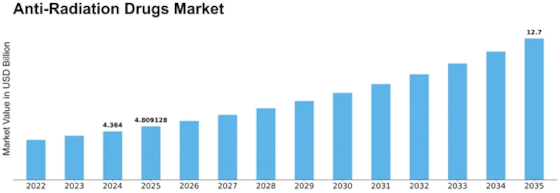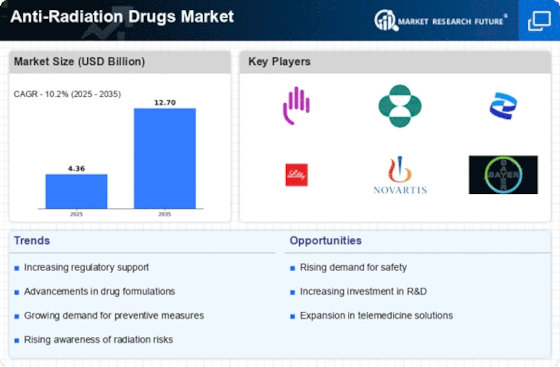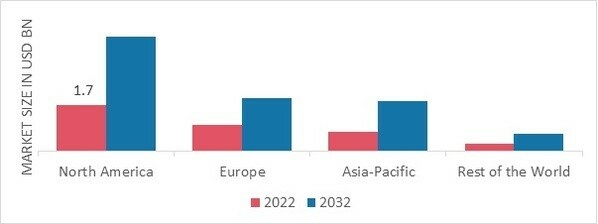-
EXECUTIVE SUMMARY
-
MARKET INTRODUCTION
-
Definition
- Research Objective
- Assumptions
-
2.2.
-
Scope of the Study
-
2.2.3.
-
Limitations
-
RESEARCH METHODOLOGY
-
Overview
-
Data Mining
-
Secondary Research
-
Primary Research
- Primary Interviews
- Breakdown of Primary Respondents
-
and Information Gathering Process
-
Forecasting Modality
-
Market Size Estimation
- Bottom-Up
- Top-Down Approach
-
Approach
-
Data Triangulation
-
Validation
-
MARKET DYNAMICS
-
Overview
-
Drivers
-
Restraints
-
Opportunities
-
MARKET FACTOR ANALYSIS
-
Value Chain Analysis
-
Porter’s Five Forces Analysis
- Bargaining Power of Suppliers
- Bargaining Power of Buyers
- Threat of New Entrants
- Intensity of Rivalry
-
5.2.4.
-
Threat of Substitutes
-
COVID-19 Impact
- Market Impact Analysis
- Regional Impact
-
Analysis
-
5.3.3.
-
Opportunity and Threat Analysis
-
GLOBAL ANTI RADIATION DRUGS MARKET, BY COMPOUND
-
Overview
-
Potassium lodide (Kl)
-
Prussian Blue
-
6.4.
-
DTPA (Diethylenetriamine Pentaacetate)
-
Others
-
GLOBAL ANTI RADIATION
-
DRUGS MARKET, BY APPLICATION
-
Overview
-
Acute Radiation Syndrome
-
(ARS)
-
Cancer Treatment
-
Radiation Exposure
-
Others
-
GLOBAL ANTI RADIATION DRUGS MARKET, BY DISTRIBUTION CHANNEL
-
Overview
-
Hospital Pharmacies
-
Retail Pharmacies
-
Others
-
9.
-
GLOBAL ANTI RADIATION DRUGS MARKET, BY REGION
-
Overview
-
North
- U.S.
- Canada
-
America
-
Europe
- Germany
- France
- U.K
- Italy
- Spain
-
9.3.6.
-
Rest of Europe
-
Asia-Pacific
- China
- India
- South Korea
- Australia
- Rest of Asia-Pacific
-
9.4.3.
-
Japan
-
Rest of the World
- Middle East
- Africa
-
9.5.3.
-
Latin America
-
COMPETITIVE LANDSCAPE
-
Overview
-
Competitive
-
Analysis
-
Market Share Analysis
-
Major Growth Strategy in the
-
Global Anti radiation drugs Market,
-
Competitive Benchmarking
-
10.6.
-
Leading Players in Terms of Number of Developments in the Global Anti radiation
-
drugs Market,
-
Key developments and Growth Strategies
- New
- Merger & Acquisitions
- Joint Ventures
-
Compound Launch/Application Deployment
-
Major Players Financial Matrix
- Major Players R&D Expenditure.
-
10.8.1.
-
Sales & Operating Income, 2022
-
COMPANY PROFILES
-
Amgen Inc.
- Company Overview
- Financial Overview
- Compounds Offered
- Key Developments
- SWOT Analysis
- Key Strategies
-
Anbex Inc.
- Financial Overview
- Compounds Offered
- Key Developments
- SWOT Analysis
- Key Strategies
-
11.2.1.
-
Company Overview
-
Arco Pharmaceuticals LLC
- Company Overview
- Financial
- Compounds Offered
- Key Developments
- Key Strategies
-
Overview
-
11.3.5.
-
SWOT Analysis
-
BTG International Inc.
- Financial Overview
- Compounds Offered
- Key Developments
- SWOT Analysis
- Key Strategies
-
11.4.1.
-
Company Overview
-
Cellphire, Inc.
- Company Overview
- Financial Overview
- Compounds Offered
- Key Developments
- SWOT Analysis
- Key Strategies
-
CHRYSALIS BIOTHERAPEUTICS, INC.
- Financial Overview
- Compounds Offered
- Key Developments
- SWOT Analysis
- Key Strategies
-
11.6.1.
-
Company Overview
-
Darnitsa
- Company Overview
- Financial Overview
- Compounds Offered
- Key Developments
- SWOT Analysis
- Key Strategies
-
Enzychem Lifesciences Corporation
- Financial Overview
- Compounds Offered
- Key Developments
- SWOT Analysis
- Key Strategies
-
11.8.1.
-
Company Overview
-
Humanetics Corporation
- Company Overview
- Financial
- Compounds Offered
- Key Developments
- Key Strategies
-
Overview
-
11.9.5.
-
SWOT Analysis
-
Mission Pharmacal Company
- Company Overview
- Financial Overview
- Compounds
- Key Developments
- SWOT Analysis
-
Offered
-
11.10.6.
-
Key Strategies
-
Myelo Therapeutics GmbH
- Company Overview
- Financial Overview
- Compounds Offered
- Key
- SWOT Analysis
- Key Strategies
- Company Overview
- Financial Overview
- Compounds Offered
- Key Developments
- SWOT Analysis
- Key Strategies
-
Developments
-
11.12.
-
Partner Therapeutics
-
Pluri Inc.
- Company Overview
- Financial Overview
- Compounds Offered
- Key
- SWOT Analysis
- Key Strategies
-
Developments
-
APPENDIX
-
References
-
Related Reports
-
-
LIST OF TABLES
-
GLOBAL ANTI RADIATION DRUGS MARKET, SYNOPSIS, 2018-2032
-
GLOBAL
-
ANTI RADIATION DRUGS MARKET, ESTIMATES & FORECAST, 2018-2032 (USD BILLION)
-
GLOBAL ANTI RADIATION DRUGS MARKET, BY COMPOUND, 2018-2032 (USD BILLION)
-
GLOBAL ANTI RADIATION DRUGS MARKET, BY APPLICATION, 2018-2032 (USD BILLION)
-
GLOBAL ANTI RADIATION DRUGS MARKET, BY DISTRIBUTION CHANNEL, 2018-2032
-
(USD BILLION)
-
NORTH AMERICA ANTI RADIATION DRUGS MARKET, BY COMPOUND,
-
NORTH AMERICA ANTI RADIATION DRUGS MARKET,
-
BY APPLICATION, 2018-2032 (USD BILLION)
-
NORTH AMERICA ANTI RADIATION
-
DRUGS MARKET, BY DISTRIBUTION CHANNEL, 2018-2032 (USD BILLION)
-
NORTH
-
AMERICA ANTI RADIATION DRUGS MARKET, BY COUNTRY, 2018-2032 (USD BILLION)
-
TABLE
-
U.S. ANTI RADIATION DRUGS MARKET, BY COMPOUND, 2018-2032 (USD BILLION)
-
TABLE
-
U.S. ANTI RADIATION DRUGS MARKET, BY APPLICATION, 2018-2032 (USD BILLION)
-
U.S. ANTI RADIATION DRUGS MARKET, BY DISTRIBUTION CHANNEL, 2018-2032
-
(USD BILLION)
-
CANADA ANTI RADIATION DRUGS MARKET, BY COMPOUND, 2018-2032
-
(USD BILLION)
-
CANADA ANTI RADIATION DRUGS MARKET, BY APPLICATION,
-
CANADA ANTI RADIATION DRUGS MARKET, BY DISTRIBUTION
-
CHANNEL, 2018-2032 (USD BILLION)
-
EUROPE ANTI RADIATION DRUGS MARKET,
-
BY COMPOUND, 2018-2032 (USD BILLION)
-
EUROPE ANTI RADIATION DRUGS MARKET,
-
BY APPLICATION, 2018-2032 (USD BILLION)
-
EUROPE ANTI RADIATION DRUGS
-
MARKET, BY DISTRIBUTION CHANNEL, 2018-2032 (USD BILLION)
-
EUROPE ANTI
-
RADIATION DRUGS MARKET, BY COUNTRY, 2018-2032 (USD BILLION)
-
GERMANY
-
ANTI RADIATION DRUGS MARKET, BY COMPOUND, 2018-2032 (USD BILLION)
-
TABLE 21
-
GERMANY ANTI RADIATION DRUGS MARKET, BY APPLICATION, 2018-2032 (USD BILLION)
-
GERMANY ANTI RADIATION DRUGS MARKET, BY DISTRIBUTION CHANNEL, 2018-2032
-
(USD BILLION)
-
FRANCE ANTI RADIATION DRUGS MARKET, BY COMPOUND, 2018-2032
-
(USD BILLION)
-
FRANCE ANTI RADIATION DRUGS MARKET, BY APPLICATION,
-
FRANCE ANTI RADIATION DRUGS MARKET, BY DISTRIBUTION
-
CHANNEL, 2018-2032 (USD BILLION)
-
ITALY ANTI RADIATION DRUGS MARKET,
-
BY COMPOUND, 2018-2032 (USD BILLION)
-
ITALY ANTI RADIATION DRUGS MARKET,
-
BY APPLICATION, 2018-2032 (USD BILLION)
-
ITALY ANTI RADIATION DRUGS
-
MARKET, BY DISTRIBUTION CHANNEL, 2018-2032 (USD BILLION)
-
SPAIN ANTI
-
RADIATION DRUGS MARKET, BY COMPOUND, 2018-2032 (USD BILLION)
-
SPAIN
-
ANTI RADIATION DRUGS MARKET, BY APPLICATION, 2018-2032 (USD BILLION)
-
TABLE
-
SPAIN ANTI RADIATION DRUGS MARKET, BY DISTRIBUTION CHANNEL, 2018-2032 (USD BILLION)
-
U.K ANTI RADIATION DRUGS MARKET, BY COMPOUND, 2018-2032 (USD BILLION)
-
U.K ANTI RADIATION DRUGS MARKET, BY APPLICATION, 2018-2032 (USD BILLION)
-
U.K ANTI RADIATION DRUGS MARKET, BY DISTRIBUTION CHANNEL, 2018-2032 (USD
-
BILLION)
-
REST OF EUROPE ANTI RADIATION DRUGS MARKET, BY COMPOUND,
-
REST OF EUROPE ANTI RADIATION DRUGS MARKET,
-
BY APPLICATION, 2018-2032 (USD BILLION)
-
REST OF EUROPE ANTI RADIATION
-
DRUGS MARKET, BY DISTRIBUTION CHANNEL, 2018-2032 (USD BILLION)
-
ASIA
-
PACIFIC ANTI RADIATION DRUGS MARKET, BY COMPOUND, 2018-2032 (USD BILLION)
-
TABLE
-
ASIA PACIFIC ANTI RADIATION DRUGS MARKET, BY APPLICATION, 2018-2032 (USD BILLION)
-
ASIA PACIFIC ANTI RADIATION DRUGS MARKET, BY DISTRIBUTION CHANNEL, 2018-2032
-
(USD BILLION)
-
ASIA PACIFIC ANTI RADIATION DRUGS MARKET, BY COUNTRY,
-
JAPAN ANTI RADIATION DRUGS MARKET, BY COMPOUND,
-
JAPAN ANTI RADIATION DRUGS MARKET, BY APPLICATION,
-
JAPAN ANTI RADIATION DRUGS MARKET, BY DISTRIBUTION
-
CHANNEL, 2018-2032 (USD BILLION)
-
CHINA ANTI RADIATION DRUGS MARKET,
-
BY COMPOUND, 2018-2032 (USD BILLION)
-
CHINA ANTI RADIATION DRUGS MARKET,
-
BY APPLICATION, 2018-2032 (USD BILLION)
-
CHINA ANTI RADIATION DRUGS
-
MARKET, BY DISTRIBUTION CHANNEL, 2018-2032 (USD BILLION)
-
INDIA ANTI
-
RADIATION DRUGS MARKET, BY COMPOUND, 2018-2032 (USD BILLION)
-
INDIA
-
ANTI RADIATION DRUGS MARKET, BY APPLICATION, 2018-2032 (USD BILLION)
-
TABLE
-
INDIA ANTI RADIATION DRUGS MARKET, BY DISTRIBUTION CHANNEL, 2018-2032 (USD BILLION)
-
AUSTRALIA ANTI RADIATION DRUGS MARKET, BY COMPOUND, 2018-2032 (USD BILLION)
-
AUSTRALIA ANTI RADIATION DRUGS MARKET, BY APPLICATION, 2018-2032 (USD
-
BILLION)
-
AUSTRALIA ANTI RADIATION DRUGS MARKET, BY DISTRIBUTION CHANNEL,
-
SOUTH KOREA ANTI RADIATION DRUGS MARKET, BY
-
COMPOUND, 2018-2032 (USD BILLION)
-
SOUTH KOREA ANTI RADIATION DRUGS
-
MARKET, BY APPLICATION, 2018-2032 (USD BILLION)
-
SOUTH KOREA ANTI RADIATION
-
DRUGS MARKET, BY DISTRIBUTION CHANNEL, 2018-2032 (USD BILLION)
-
REST
-
OF ASIA-PACIFIC ANTI RADIATION DRUGS MARKET, BY COMPOUND, 2018-2032 (USD BILLION)
-
REST OF ASIA-PACIFIC ANTI RADIATION DRUGS MARKET, BY APPLICATION, 2018-2032
-
(USD BILLION)
-
REST OF ASIA-PACIFIC ANTI RADIATION DRUGS MARKET, BY
-
DISTRIBUTION CHANNEL, 2018-2032 (USD BILLION)
-
REST OF WORLD ANTI RADIATION
-
DRUGS MARKET, BY COMPOUND, 2018-2032 (USD BILLION)
-
REST OF WORLD ANTI
-
RADIATION DRUGS MARKET, BY APPLICATION, 2018-2032 (USD BILLION)
-
REST
-
OF WORLD ANTI RADIATION DRUGS MARKET, BY DISTRIBUTION CHANNEL, 2018-2032 (USD BILLION)
-
REST OF WORLD ANTI RADIATION DRUGS MARKET, BY COUNTRY, 2018-2032 (USD
-
BILLION)
-
MIDDLE EAST ANTI RADIATION DRUGS MARKET, BY COMPOUND, 2018-2032
-
(USD BILLION)
-
MIDDLE EAST ANTI RADIATION DRUGS MARKET, BY APPLICATION,
-
MIDDLE EAST ANTI RADIATION DRUGS MARKET, BY
-
DISTRIBUTION CHANNEL, 2018-2032 (USD BILLION)
-
AFRICA ANTI RADIATION
-
DRUGS MARKET, BY COMPOUND, 2018-2032 (USD BILLION)
-
AFRICA ANTI RADIATION
-
DRUGS MARKET, BY APPLICATION, 2018-2032 (USD BILLION)
-
AFRICA ANTI
-
RADIATION DRUGS MARKET, BY DISTRIBUTION CHANNEL, 2018-2032 (USD BILLION)
-
TABLE
-
LATIN AMERICA ANTI RADIATION DRUGS MARKET, BY COMPOUND, 2018-2032 (USD BILLION)
-
LATIN AMERICA ANTI RADIATION DRUGS MARKET, BY APPLICATION, 2018-2032
-
(USD BILLION)
-
LATIN AMERICA ANTI RADIATION DRUGS MARKET, BY DISTRIBUTION
-
CHANNEL, 2018-2032 (USD BILLION)
-
LIST OF FIGURES
-
RESEARCH
-
PROCESS
-
MARKET STRUCTURE FOR THE GLOBAL ANTI RADIATION DRUGS MARKET
-
MARKET DYNAMICS FOR THE GLOBAL ANTI RADIATION DRUGS MARKET
-
FIGURE
-
GLOBAL ANTI RADIATION DRUGS MARKET, SHARE (%), BY COMPOUND, 2022
-
FIGURE 5
-
GLOBAL ANTI RADIATION DRUGS MARKET, SHARE (%), BY APPLICATION, 2022
-
FIGURE
-
GLOBAL ANTI RADIATION DRUGS MARKET, SHARE (%), BY DISTRIBUTION CHANNEL, 2022
-
GLOBAL ANTI RADIATION DRUGS MARKET, SHARE (%), BY REGION, 2022
-
FIGURE
-
NORTH AMERICA: ANTI RADIATION DRUGS MARKET, SHARE (%), BY REGION, 2022
-
FIGURE
-
EUROPE: ANTI RADIATION DRUGS MARKET, SHARE (%), BY REGION, 2022
-
FIGURE 10
-
ASIA-PACIFIC: ANTI RADIATION DRUGS MARKET, SHARE (%), BY REGION, 2022
-
FIGURE
-
REST OF THE WORLD: ANTI RADIATION DRUGS MARKET, SHARE (%), BY REGION, 2022
-
GLOBAL ANTI RADIATION DRUGS MARKET: COMPANY SHARE ANALYSIS, 2022 (%)
-
AMGEN INC.: FINANCIAL OVERVIEW SNAPSHOT
-
AMGEN INC.: SWOT
-
ANALYSIS
-
ANBEX INC.: FINANCIAL OVERVIEW SNAPSHOT
-
FIGURE 16
-
ANBEX INC.: SWOT ANALYSIS
-
ARCO PHARMACEUTICALS LLC: FINANCIAL OVERVIEW
-
SNAPSHOT
-
ARCO PHARMACEUTICALS LLC: SWOT ANALYSIS
-
BTG
-
INTERNATIONAL INC.: FINANCIAL OVERVIEW SNAPSHOT
-
BTG INTERNATIONAL
-
INC.: SWOT ANALYSIS
-
CELLPHIRE, INC..: FINANCIAL OVERVIEW SNAPSHOT
-
CELLPHIRE, INC..: SWOT ANALYSIS
-
CHRYSALIS BIOTHERAPEUTICS,
-
INC.: FINANCIAL OVERVIEW SNAPSHOT
-
CHRYSALIS BIOTHERAPEUTICS, INC.:
-
SWOT ANALYSIS
-
DARNITSA: FINANCIAL OVERVIEW SNAPSHOT
-
FIGURE
-
DARNITSA: SWOT ANALYSIS
-
ENZYCHEM LIFESCIENCES CORPORATION: FINANCIAL
-
OVERVIEW SNAPSHOT
-
ENZYCHEM LIFESCIENCES CORPORATION: SWOT ANALYSIS
-
HUMANETICS CORPORATION: FINANCIAL OVERVIEW SNAPSHOT
-
FIGURE
-
HUMANETICS CORPORATION: SWOT ANALYSIS
-
MISSION PHARMACAL COMPANY:
-
FINANCIAL OVERVIEW SNAPSHOT
-
MISSION PHARMACAL COMPANY: SWOT ANALYSIS
-
MYELO THERAPEUTICS GMBH: FINANCIAL OVERVIEW SNAPSHOT
-
FIGURE
-
MYELO THERAPEUTICS GMBH: SWOT ANALYSIS
-
PARTNER THERAPEUTICS:
-
FINANCIAL OVERVIEW SNAPSHOT
-
PARTNER THERAPEUTICS: SWOT ANALYSIS
-
PLURI INC.: FINANCIAL OVERVIEW SNAPSHOT
-
PLURI INC.:
-
SWOT ANALYSIS











Leave a Comment